In a time of new beginnings, endings seem to hit even harder.
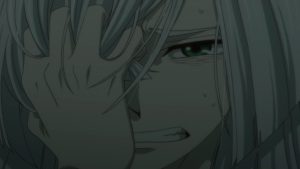 The first series finale of the season (for me) is certainly from one of the best shows airing, Mahoutsukai no Yome. This is one one of those series review posts where my impulse is to talk more about the series as a whole than the ending – whether that’s an implicit criticism of that ending or not, I can’t say. I do know that on balance I don’t consider the series’ final arc to be its best, or the second cour to be overall as strong as the first. But when you’re starting from as high a baseline as The Ancient Magus’ Bride, that still leaves a lot of room above the Mendoza line.
The first series finale of the season (for me) is certainly from one of the best shows airing, Mahoutsukai no Yome. This is one one of those series review posts where my impulse is to talk more about the series as a whole than the ending – whether that’s an implicit criticism of that ending or not, I can’t say. I do know that on balance I don’t consider the series’ final arc to be its best, or the second cour to be overall as strong as the first. But when you’re starting from as high a baseline as The Ancient Magus’ Bride, that still leaves a lot of room above the Mendoza line.
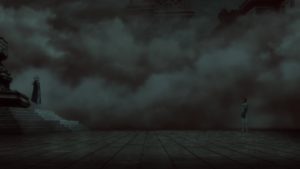 On some level, a showdown between Cartaphilus and Chise was always going to be a bit of an anti-climax as a series-ender, no matter how well it was brought off. And I don’t think Yamazaki-sensei ever intended it to be one – it’s just a matter of timing, really. This is where the manga is, so the anime either had to focus on this storyline or come up with an altogether original ending (just how original this ending was won’t be known until the next manga chapter releases, which should prove interesting indeed). There isn’t the same level of emotional buy-in as there is with the central characters, no matter how important a villain Joseph is.
On some level, a showdown between Cartaphilus and Chise was always going to be a bit of an anti-climax as a series-ender, no matter how well it was brought off. And I don’t think Yamazaki-sensei ever intended it to be one – it’s just a matter of timing, really. This is where the manga is, so the anime either had to focus on this storyline or come up with an altogether original ending (just how original this ending was won’t be known until the next manga chapter releases, which should prove interesting indeed). There isn’t the same level of emotional buy-in as there is with the central characters, no matter how important a villain Joseph is.
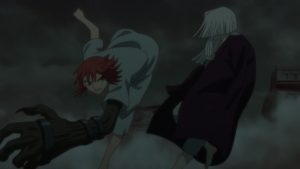 To be honest, I’m not absolutely sure I understand exactly what did happen here. It’s obvious that Chise cooked up a plan in advance with Elias (a temporary truce was in effect on that front). Chise more or less goaded Cartaphilus into attacking and seemingly killing her – with the endgame being Elias fusing she and Cartaphilus into one being. Cartaphilus gets some help from Ashen Eye, but he seems more interested in relieving his boredom than actually being an ally. This is the problem with beings that ancient – be it eternal rot or immense boredom, the odds are thin that anyone can be sentient that long and remain sane.
To be honest, I’m not absolutely sure I understand exactly what did happen here. It’s obvious that Chise cooked up a plan in advance with Elias (a temporary truce was in effect on that front). Chise more or less goaded Cartaphilus into attacking and seemingly killing her – with the endgame being Elias fusing she and Cartaphilus into one being. Cartaphilus gets some help from Ashen Eye, but he seems more interested in relieving his boredom than actually being an ally. This is the problem with beings that ancient – be it eternal rot or immense boredom, the odds are thin that anyone can be sentient that long and remain sane.
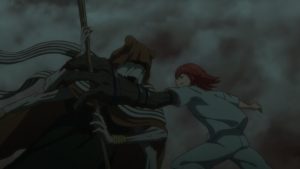 That’s where it gets confusing. Cartaphilus makes mention of being inside Chise with the dragon and coming to an agreement – he’ll keep her alive for a while, and the dragon will someday kill her. But we later find out that the dragon is back with Lindel – and we see Joseph in a hole in the ground seemingly asleep, visited by Chise. There may be an implication here that in fusing Cartaphilus with herself, Chise freed Joseph – and the one in the bed is he alone, freed of Cartaphilus (though that wouldn’t account for the dragon thing). Honestly I think it’s a bit of a jumble, executed (by necessity, albeit) quite a bit too quickly.
That’s where it gets confusing. Cartaphilus makes mention of being inside Chise with the dragon and coming to an agreement – he’ll keep her alive for a while, and the dragon will someday kill her. But we later find out that the dragon is back with Lindel – and we see Joseph in a hole in the ground seemingly asleep, visited by Chise. There may be an implication here that in fusing Cartaphilus with herself, Chise freed Joseph – and the one in the bed is he alone, freed of Cartaphilus (though that wouldn’t account for the dragon thing). Honestly I think it’s a bit of a jumble, executed (by necessity, albeit) quite a bit too quickly.
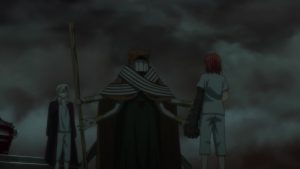 At the very least, this whole situation has again revealed what a compassionate creature Chise is. As someone who’s suffered a great deal herself, Chise is more likely than most to empathize with what Cartaphilus has gone through, no matter how many nasty things he’s done. But compassionate or not, I felt that she forgave Elias and Ruth quite a bit too quickly – that was another loose end that I think was tied up too neatly out of expediency. Ruth I can see – he’s just a dog in the end, and his very existence is defined by his loyalty to Chise. But what Elias did was a transgression against everything Chise believes in, and she was far too quick to move past it.
At the very least, this whole situation has again revealed what a compassionate creature Chise is. As someone who’s suffered a great deal herself, Chise is more likely than most to empathize with what Cartaphilus has gone through, no matter how many nasty things he’s done. But compassionate or not, I felt that she forgave Elias and Ruth quite a bit too quickly – that was another loose end that I think was tied up too neatly out of expediency. Ruth I can see – he’s just a dog in the end, and his very existence is defined by his loyalty to Chise. But what Elias did was a transgression against everything Chise believes in, and she was far too quick to move past it.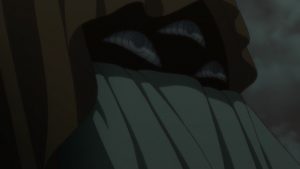
Of course, Chise doesn’t just move past it – she effectively initiates marriage proceedings with Elias. Stella has thrown her a surprise party, and – for some reason – given her a wedding dress. So, adorned as a bride, Chise waits for Elias in the woods and exchanges rings with him. I know it’s a broken record, but this all happens way too quickly for my tastes – even setting aside the two of them just having had their most serious fight, I never got a sense that Chise was ready to make this step. But it’s the final episode and the name of the series is “The Young Magus’ Bride“, after all . It will be very interesting to see if that scene is repeated in the manga.
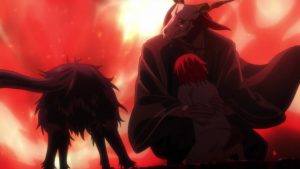 That all came out sounding more negative than I expected when I started writing this post – I actually thought this episode and this arc were very good, for what they were. Would I have wanted something a little more sanely-paced and elegiac to conclude such a profoundly beautiful series? Sure – but on balance, this way does a good job of giving the anime a sense of finality while still leaving the door open for something more in the future, once the manga has surged ahead by a few dozen chapters (if indeed it lasts that long).
That all came out sounding more negative than I expected when I started writing this post – I actually thought this episode and this arc were very good, for what they were. Would I have wanted something a little more sanely-paced and elegiac to conclude such a profoundly beautiful series? Sure – but on balance, this way does a good job of giving the anime a sense of finality while still leaving the door open for something more in the future, once the manga has surged ahead by a few dozen chapters (if indeed it lasts that long).
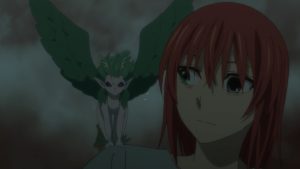 Taken as a whole, I think The Ancient Magus’ Bride firmly stamps Wit as one of the bright lights in anime. They can be relied on for outstanding production values of course, but they also have a sense of how to adapt material faithfully but not slavishly. Anime are not manga, and Wit seems to understand that in a way not every studio does. The best moments of this series were right up there with some of the most beautifully drawn TV anime of the past decade – not just fluidly animated and detailed, but full of soul and creativity.
Taken as a whole, I think The Ancient Magus’ Bride firmly stamps Wit as one of the bright lights in anime. They can be relied on for outstanding production values of course, but they also have a sense of how to adapt material faithfully but not slavishly. Anime are not manga, and Wit seems to understand that in a way not every studio does. The best moments of this series were right up there with some of the most beautifully drawn TV anime of the past decade – not just fluidly animated and detailed, but full of soul and creativity.
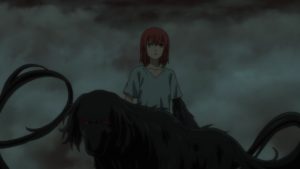 While there are a few awkward elements to Yamazaki Kore’s writing, on balance I think Mahoutsukai no Yome is a series of considerable power and substance. It explores damaged souls in a way few manga or anime have been able to do, and offers perhaps the most compelling and authentic Japanese take on European mythology in recent years. As a love story, it works – in spite or perhaps even because of the strangeness of it. That two people as lost as Chise and Elias could find each other is a small miracle, but the difficulty for two so broken to forge a healthy bond is never glossed over (apart perhaps from a bit in the finale) or sugarcoated. It’s a great anime, nearly but not quite a masterpiece just like the manga, and I would certainly love to see it someday get a finale fully worthy of that.
While there are a few awkward elements to Yamazaki Kore’s writing, on balance I think Mahoutsukai no Yome is a series of considerable power and substance. It explores damaged souls in a way few manga or anime have been able to do, and offers perhaps the most compelling and authentic Japanese take on European mythology in recent years. As a love story, it works – in spite or perhaps even because of the strangeness of it. That two people as lost as Chise and Elias could find each other is a small miracle, but the difficulty for two so broken to forge a healthy bond is never glossed over (apart perhaps from a bit in the finale) or sugarcoated. It’s a great anime, nearly but not quite a masterpiece just like the manga, and I would certainly love to see it someday get a finale fully worthy of that.


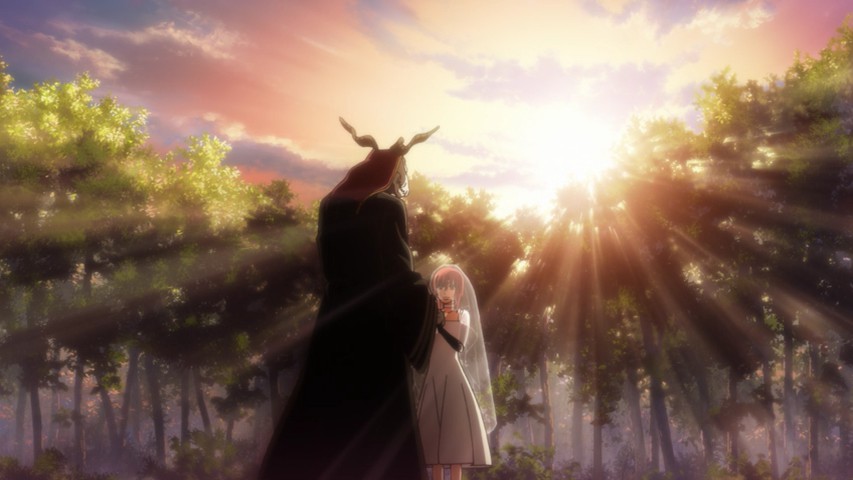
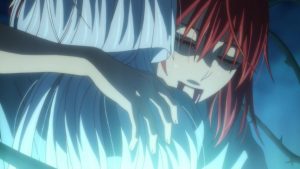
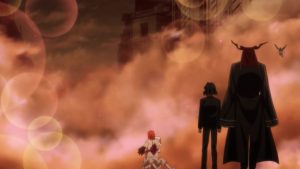
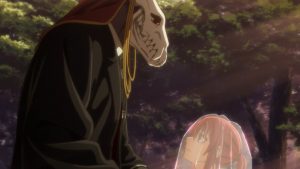
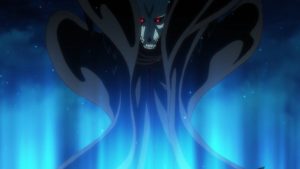
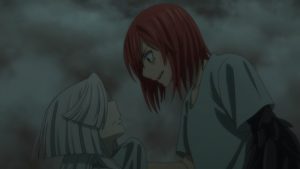
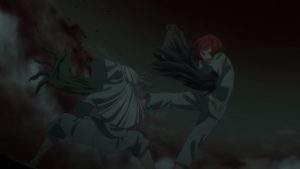
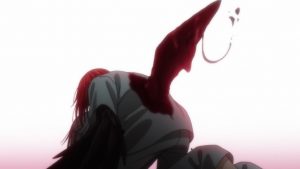
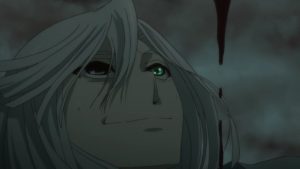
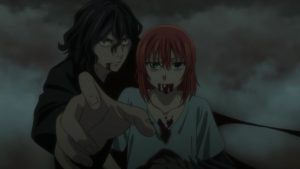
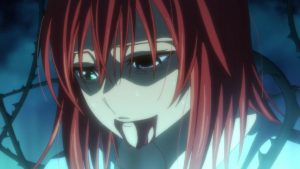
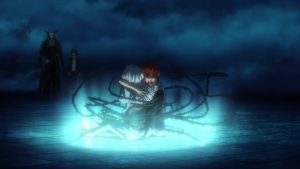
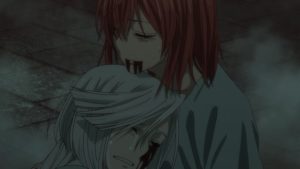
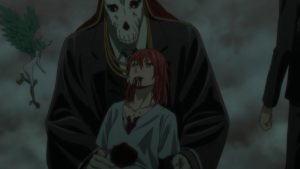
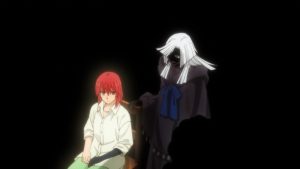
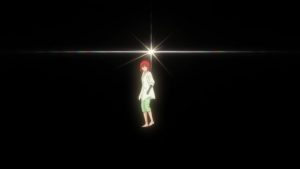
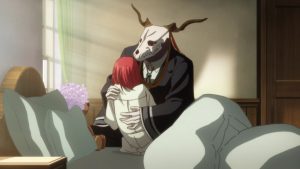
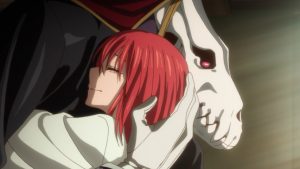
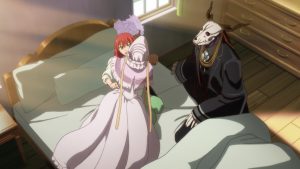
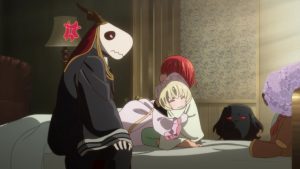
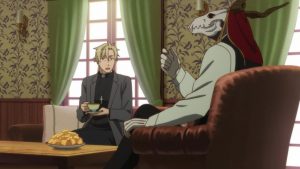
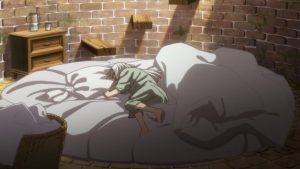
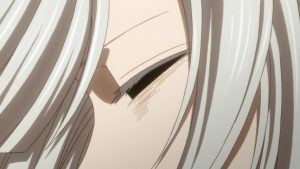
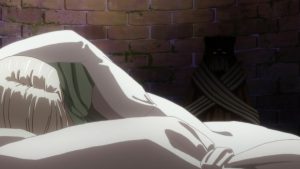

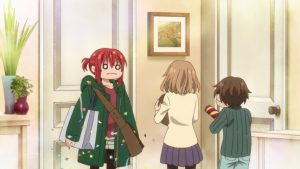
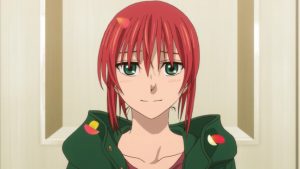
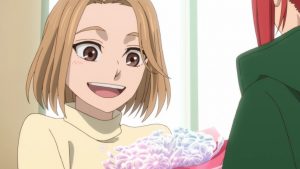
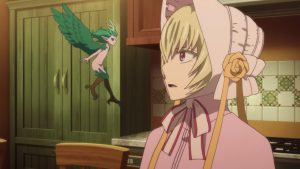
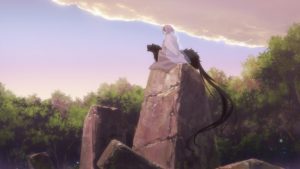
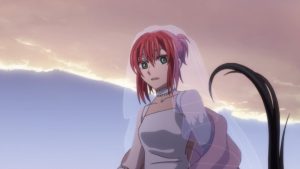
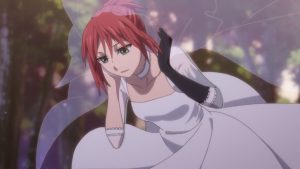
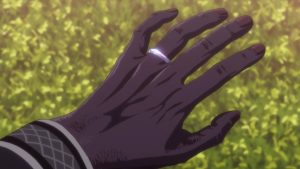
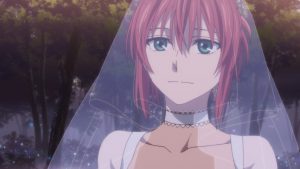
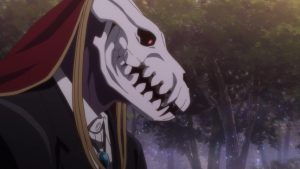
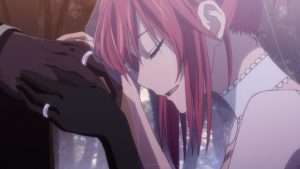
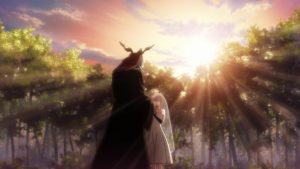
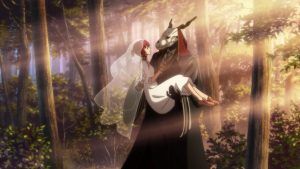
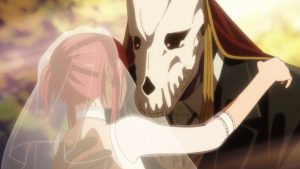
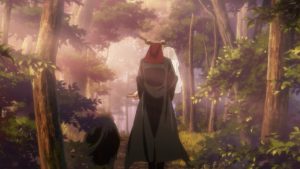
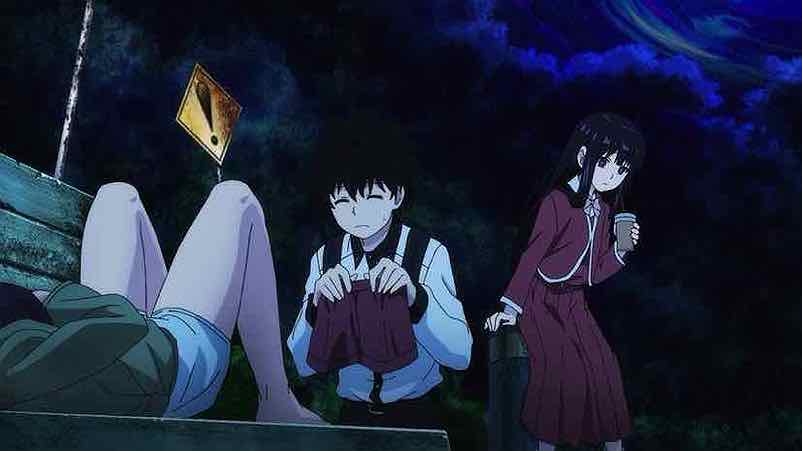
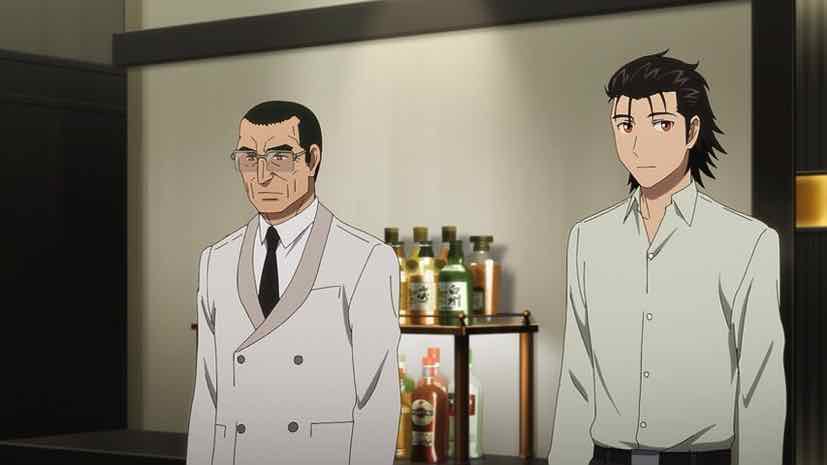
elianthos80
March 25, 2018 at 7:22 amPersonally I found myself disconnetted from what was happening on screen this week * sigh * . It felt rushed ( and that was expected ) but also lacking of nuance during the showdown especially.
The second half was better than the first in a vacuum – more loyal to the spirit and tone of the series imho – but still rushed and the final especially would have made sense as a distant conclusion with a robust timeskip – seeing how they glossed over those pesky life and death and trust Stella-related matters between them at least imply it took them SOME time to smooth that patch XP – .
Fashion aside for thee Enzo: a white dress [like that] per se does not a bridal dress make – and given the folkloric blend setting especially who knows what kind of attire we would end up with if any in the manga – . It’s the matching it with the veil that creates the association. I’ve spotted white dresses cut like that in shops just last Summer, it’s a cyclic thing for Spring/Summer women’s fashion especially. I even own one white dress myself and I have no plans to marry 😛
The proposal itself was… endearing and visually very pleasant, but it did remind me of a certain Japanese anime skater ‘proposal’ just a bit and that as much as I am fond of that scene took me out of this scene a little.
In the end I still prefer the manga over the anime but I’m glad they adapted it and managed to deliver a few truly enchanting and poignant moments along the way.
Jonathan Tappan
March 25, 2018 at 10:45 amIf you’ll review the final arc I think the whole fusing business will make a lot more sense.
elianthos
March 25, 2018 at 12:58 pmP.S. something I really liked from this episode is Chise’s lullaby, as
1) it conveys her journey into finding and learning love (for and to herself, but also when it concerns others’ bonds) through a rather maternal gesture.
2) the flowers in the lyrics of that lullaby are another piece of that and also tie back to the flower symbolism accompanying her since early on: the crystal flowers vs the vines and blooms ( also foil to Elias’ thorns ) of her magic, the poppies in her memories with her mother, the blue flowers field in Mina&Matthew’s catharsis, Redcurrant&Joel’s rose garden, and her own crystal flowers birthday bouquet gift to Stella at last… each occurrence gaining a stronger healing/hopeful/thankful vibe 🙂
The wild guesser
March 25, 2018 at 2:27 pmYou know, after the loyalty to the source material displayed by Wit, I’m confident in their on-coming adaptation of Vinland Saga.
Guardian Enzo
March 25, 2018 at 3:27 pmThat’s a manga that’s escaped my purview despite how famous it is. Where would you rank it in the big picture?
Matti
March 27, 2018 at 7:41 amI liked Vinland Saga for a while. Then it suddenly become Farmland Saga, and I somewhat lost interest and put it on my backlog. probably a good time to get back to reading it.
Thumpthump
March 25, 2018 at 5:30 pmThat was a very pleasant surprise!
Albione
March 25, 2018 at 11:16 pmThe final three episodes left me behind. Probably for personal reasons, but Chise saying she cannot forgive her mother and then being all happy with Elias and helping Cartaphilus left a bad taste. So it is ok trying to kill a young girl to save her, but not ok to kill onself when you realise you are going to hurt your child.
nyalagrace
April 3, 2018 at 8:20 pmShe can forgive Elias because he is there for her to talk it out with. They were able to come to an agreement and talk through all of their feelings on the subject. It would make no sense for her to forgive her mother. For one, she isn’t there as someone Chise can talk it out with. There will never be an opportunity for resolution or even an understanding between them, because her mother left so permanently. For two, given Chise’s life experiences and her current behavior, it is easier for her to leave than feel left behind. The people that were supposed to provide a solid support system for her (her parents) left. While she can understand her mother’s need to protect her, she cannot reconcile that with the feeling of being permanently left behind, hence Chise’s lack of forgiveness.
nyalagrace
April 3, 2018 at 8:38 pmIf you go back and watch earlier episodes (I really can’t remember which ones but this whole business started at like ep. 18-20) you will remember that it is not the dragon inside her (and never was) but is the dragon’s *curse*. Cartaphilus was ‘given’ to Chise when Joseph switched their eyes. I’m not entirely sure what deal she and Elias made, hopefully that will be cleared up in the manga, but it did end up fusing her with Cartaphilus who managed to make a deal of sorts with the curse running through her to allow Chise to live for at least a while longer. So, it’s not the dragon, but the curse she picked up from attempting to stop the dragon that is with her currently.
I do agree with you that this anime and manga have a very unique way of “exploring damaged souls.” I like the way you put that. I can connect with Chise, myself being someone who fears being left behind to the extent of finding leaving easier. I’ve never had the desire to go to the extremes she’s gone to, but I can empathize with her decisions. I like how The Ancient Magus’ Bride explored these ideas, and with such beautiful artwork.
Also, I like that the anime left off any further information about her family and why her father may have left. While I would appreciate those details being filled in, perhaps by the manga, some people never find out their biggest life mysteries and that’s okay. That’s just life and this whole ordeal has been about coping with the darker parts of life and making it work.
Kurik
April 10, 2018 at 4:32 amYeah….I put off watching this immediately at release because I didn’t want it to end but watched it over the weekend and I must say I fully agree with Enzo that it was rushed and a bit confusing. My take on the dragon bit is that she took the bad essence from the dragon as you recall the dragon was outside her window when she got the hand. That means the dragon is back home with the other one Jospeh captured. Again, I am thinking she has the essence of Cart and the dragon he speaks of is the cursed dragon essence that was killing her. The rest makes little sense to me but hey still a beautiful show on a whole and would happily recommend it. Will be missed.